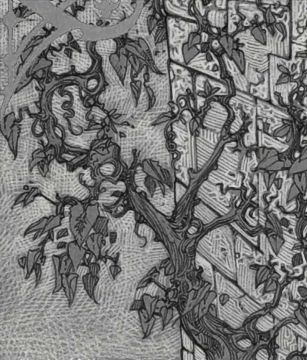

MC Ravenloft Appendix III (Creatures of Darkness)

| Climate/Terrain: | Temperate lands |
|---|---|
| Frequency: | Very rare |
| Organization: | Colony |
| Activity Cycle: | Any |
| Diet: | Blood/body fluids |
| Intelligence: | Semi- (2-4) |
| Treasure: | Nil |
| Alignment: | Neutral |
| No. Appearing: | 3-10 (1d8+2) |
| Armor Class: | 6 |
| Movement: | 6 |
| Hit Dice: | 7 or 8 |
| THAC0: | 13 |
| No. of Attacks: | 2 |
| Damage/Attack: | 1-6 |
| Special Attacks: | Entangle and blood drain |
| Special Defenses: | Spell immunities |
| Magic Resistance: | Nil |
| Size: | G (4’ per Hit Die) |
| Morale: | Steady (11) |
| XP Value: | 7 HD: 1,400 8 HD: 2,000 |
Crawling ivy is a semi-intelligent plant that was developed through magical experimentation. It is usually found on the walls of old houses, encircling large trees of as ground cover. This many-branched vine moves to trap and feed upon those who stray too close to it. It can move to bring a victim within range, grasping with its rootlets and crawling along a wall or the ground.
Looking much like normal ivy, crawling ivy is a dark, glossy green. The leaves are triangular and veined. In autumn, crawling ivy erupts with clumps of yellow flowers which produce bitter, black berries. The woody stem of the plant is supported in its climb by masses of small rootlets on its underside that cling to crevices and irregularities. Crawling ivy can be distinguished from normal ivy by its veining, which is not green, but a pale magenta. Close examination of the leaves reveals tiny pores or openings throughout the surface.
Crawling ivy appears to have no ability to communicate with other creatures. Proper use of magic might make it possible to speak with the plant, but what it might reveal is uncertain.
Combat: Anyone coming into contact with or standing within 3 feet of crawling ivy may be attacked by it. The plant prefers to let its victims get as close as possible before striking. If someone is actually climbing the wall where crawling ivy has established itself (or walking through a bed of it, when it is used as ground cover), the ivy gains a +4 bonus on its attack rolls. Because it looks so ordinary, those who do not know of its properties are given a -3 penalty to their surprise rolls when the plant attacks.
Crawling ivy begins its attacks by trying to entangle a victim (as per the 1st level priest spell). Those subjected to this attack must save vs. spell or be caught.
Once the victim is rendered immobile, the ivy makes two attacks per round with its leafy vines. The leaves fasten upon the captive while the vine itself moves to strangle the victim, doing 1-6 points of damage per successful hit.
Should the victim not be entangled, he may fight back or try to move out of range of the ivy. If caught, however, the captive is powerless to help himself.
Those who are held fast must be rescued by a third party or must make a successful bend bars roll to get an arm free. When the victim has lost half his hit points, or at the end of the fourth round that he fails to break free from a strangling vine, the ivy has rendered him unconscious.
At that point, the vines simply hold the captive, while the leaves take over. These open their pores and begin exerting a powerful suction on any exposed skin they can reach, pulling the victim’s blood up through the lesions thus created. This inflicts 1d6 points of damage per round, and only ceases when the victim is a dried husk with no body fluids left.
Crawling ivy is vulnerable to spells that affect plants. It is immune to mind affecting or illusion spells, and takes only half damage from fire of cold-based attacks.
Habitat/Society: Crawling ivy feeds on blood and body fluids. It has no need for sunlight or water. A very sophisticated valve and pump system within the veins of the leaves allows the sectioning of blood and pumps fluids throughout the plant. Crawling ivy must receive sustenance equal to one victim for each Hit Die it has per week or begin to brown and die.
Often used as a guardian by those who value their privacy, the ivy is intelligent enough to serve a master in return for food. Though several colonies may reside side-by-side, they do not compete for space or food.
Ecology: The berries produced by crawling ivy may be planted in blood-soaked earth to begin a new colony. The flowers are used in making healing potions, and in an emergency may be pressed to a wound to stop bleeding and reduce pain.
